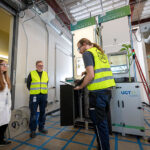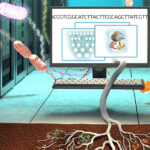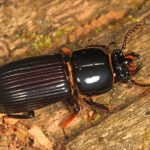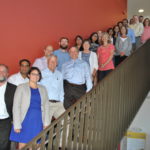Three University of California, Davis, Faculty Fellows have been awarded $25,000 each to spearhead cross-campus research projects with Berkeley Lab scientists in the field of agricultural decarbonization. With agricultural activities contributing over 10% of the United States’ total greenhouse gas emissions, the sector is a prime target for lowering emissions and addressing the climate crisis. The teams will explore innovative methods to remove and store excess carbon dioxide from the atmosphere—a practice known as carbon sequestration—and minimize energy consumption in crop production.
Improving Climate Predictions by Unlocking the Secrets of Soil Microbes
A Berkeley Lab–led team of scientists has developed a new model that incorporates genetic information from microbes, enabling them to ascertain how soil microbes store carbon supplied by plant roots. The model could inform agricultural strategies to preserve carbon in the soil, supporting both plant growth and climate change mitigation.
Bioscientists to Receive DOE Funding for Biomanufacturing and Microbiome Research
Biosciences researchers are among the recipients of four new DOE awards. Two awards will focus on reducing carbon emissions while producing bioenergy. The other two are aimed at understanding the role of microbiomes in the biogeochemical cycling of elements like carbon.
Beetle’s Gut Microbiome is Nature’s Biorefinery
A study led by Eoin Brodie and Javier Ceja-Navarro in Berkeley Lab’s Earth and Environmental Sciences Area (EESA) provides new insights into how the wood-eating passalid beetle’s complex digestive tract and resident microbes are able to efficiently turn tough plant polymers like lignin and cellulose into food and fuel. By bringing together a team of experts—including collaborators at Pacific Northwest National Laboratory and Lawrence Livermore National Laboratory—and using advanced molecular biology tools combined with spectrometry and tiny sensors, they discovered that the beetle’s gut is made up of specialized compartments, each with a distinct microbiome, that work together in a manner similar to a factory production line. “The key innovation that nature has provided here is a way to combine biochemical processes that are otherwise incompatible,” said Brodie, deputy director of EESA’s Climate and Ecosystem Sciences Division, who has a secondary affiliation in Biosciences’ Environmental Genomics and Systems Biology (EGSB) Division. The study was published in Nature Microbiology.
Read more in the Berkeley Lab News Center.
Biosciences Researchers Brief Advisory Panel for Food and Agriculture
Two Joint BioEnergy Institute (JBEI) scientists recently joined colleagues from the Earth & Environmental Sciences Area to share their expertise with the California Department of Food and Agriculture’s Science Advisory Panel. They briefed the panel on their research related to enhancing plant-microbe interactions for improved plant yields and to increasing the efficiency of genome editing tool CRISPR in plants. Read more from Earth & Environmental Sciences.
Was this page useful?








